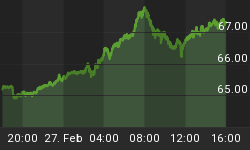Fitch says China credit bubble unprecedented in modern world history, from The Telegram (via Business Insider), June 16, 2013 - reading time 4 minutes - must read article.
From all reports, China's continued GDP growth rate and financial strength and stability has to be of pivotal importance to developed country (including the United States) sustained economic recovery. In that regard, you no doubt are aware that in recent weeks there has been increasing concern expressed with respect to both China's growth rate and its shadow banking system.
That said, I suggest an article yesterday, Fitch says China credit bubble unprecedented in modern world history, is 'must reading'. Among other things, the article says that on June 14 the China Securities Journal suggested that:
-
'total credit' in China's financial system could be as much as 2.2X China's GDP, having multiplied by 8 times over the past 10 years;
-
"Chinese corporate debt burdens are much higher than those of other economies" with "much of the liquidity being used to repay debt and not to finance output"; and,
-
"China will face large-scale outflows if there is an exit from (I think 'read U.S.') quantitative easing and the (U.S.) dollar strengthens".
Concurrently, the referenced article reports on views and warnings made by a Fitch Ratings Senior Director in Beijing (Ms. Charlene Chu) that:
-
the scale of credit in China is extreme to the point where China will find it very hard to grow its way out of past excesses, which implies tougher times going forward;
-
China's "credit-driven growth model is clearly falling apart" which "could feed into a massive over-capacity problem, and potentially into Japanese-style deflation";
-
"systemic risk is rising", and "there is no transparency in the shadow banking system";
-
the 'epicentre of risk' is in 'wealth products worth $2 trillion in lending', 50% of which loans must be rolled over every 3 months, and 25% of which loans must be rolled over in less than 6 months'. Fitch apparently believes this enables Chinese banks to 'circumvent loan curbs and impede regulation';
-
overall Chinese bank credit has increased from $9 to $23 trillion since September, 2008 - which according to Fitch means China has replicated the entire U.S. commercial banking system in 5 years; and,
-
in China the ratio of 'credit to GDP' is now 200%, compared to about 40% in the U.S. prior to the U.S. sub-prime crisis, and this means that "there is no way they (China) can grow out of their asset problems as they did in the past".
At the same time, the article reports that Fitch (via Ms. Chu):
-
I suggest importantly, still thinks 'the Chinese Government can handle any banking crisis, irrespective of how bad it is; and,
-
believes the "real question is what this (the foregoing and other comments included in the article) means for growth, and therefore for social and political risk".
Finally, the article reports on a statement made by a Societe General representative (Ms. Wei Yao) that the (I assume collective) debt service ratio of Chinese companies is now 30% of GDP. This is said to be a 'typical threshold for financial crisis'. Ms. Yao is reported further as saying:
-
many Chinese companies will not be able to pay loan interest or repay principal; and,
-
China could be on the verge of its 'debt pyramid collapsing under its own weight'.
I suggest you read the referenced article and reach your own conclusions with respect to the veracity of the Fitch Ratings, Societe General, and China Securities Journal commentaries as, if credible, this is not trite information in the context of not only the Chinese, but the world, economy going forward.
You might also want to read:
-
Major World Bank Report Survives Challenge From China, from The Wall Street Journal, June 7, 2013 - reading time 2 minutes; and,
-
China's Flawed Balance-of-Payments Position, from Project Syndicate, May 31, 2013 - reading time 3 minutes.















